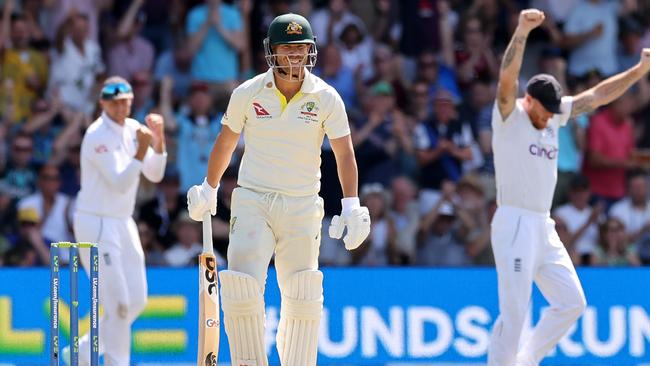Ashes 2023: Could a selection squeeze push David Warner out of the Australian side?
Stuart Broad has now dismissed David Warner 17 times and the focus is back on the opener’s place in the side. If he, Cameron Green and Mitch Marsh are all fit – who misses out?

Cricket
Don't miss out on the headlines from Cricket. Followed categories will be added to My News.
“I’m happy to nick off if I’m in the right positions and looking to score.” – David Warner, June 28, 2023.
As recently as a few days ago, it was hard to imagine a situation in which – barring injury – Warner wouldn’t play out the Ashes and get to the end of his pre-ordained farewell tour at the SCG in January.
He wasn’t completely shooting the lights out, but the veteran was at least getting regular starts: 43 in the first innings of the World Test Championship final, 36 in the second innings at Edgbaston, and then 66 and 25 at Lord’s, innings of varying pace and style. It had taken perhaps the ball of the series from Josh Tongue to end that first dig at Lord’s too.
More importantly, Warner and Usman Khawaja were doing a strong job at protecting Marnus Labuschagne, Steve Smith and Travis Head.
This was not the horror show of 2019. And it had come on the back of Warner playing more aggressively, not letting Stuart Broad dictate terms to him from around the wicket.

But remember that qualifier about injury? It happened. Except it wasn’t Warner’s injury. It was a hamstring strain to Cameron Green, one that opened the door for Mitch Marsh’s unexpected entry into the series.
Inside five sessions of the third Test, Warner had twice edged Broad to Zak Crawley for scores of four and one. Having ended a long losing streak against Jimmy Connors in 1980, the late American tennis player Vitas Gerulaitis famously quipped: “And let that be a lesson to you all. No one beats Vitas Gerulaitis 17 times in a row.”
But someone gets Warner out 17 times in Test cricket. That someone is Broad, now just two shy of the Test bunny hunter record held by Glenn McGrath to Mike Atherton, both of whom are incidentally covering this series in respective media gigs.
It wasn’t just Warner’s twin failures that have sharpened the focus on the opener’s position. Marsh’s brutal counterattacking century makes him a very difficult player to omit for the fourth Test at Old Trafford.
Cricket Australia has said that it expects Green – who it must be noted is averaging less than 20 with the bat and more than 45 with the ball on this tour – to be available for the Manchester clash, which begins on July 19.
It makes for a murky selection picture heading into the tail end of this series, after which Australia is not due to play another Test until December. That’s when Pakistan visits for a three-Test series that Warner, who will be 37 by that time, has flagged as his ideal swansong.
The cynical view of Warner’s pre-tour remarks about his retirement date, which he conceded were form-dependent, was that by giving selectors an endpoint, Warner may have given himself more leeway in any line ball call about his position. That it might be easier to give Warner one or two extra Tests than go through the rigmarole of dropping one of Australian’s greatest-ever openers.
There is a relatively recent example of the dilemma selectors may face for the fourth Test. It came in the most recent Ashes series, when Head’s Covid-19 diagnosis lead to Khawaja’s inclusion for the fourth Test in Sydney.
Khawaja would duly post two centuries, and with six specialist batters unable to fit into five spots, it was Marcus Harris – Australia’s top-scorer only one match earlier in Melbourne – who was squeezed out for the series finale in Hobart.
Harris hasn’t played since. The irony is that he had been anointed the player most likely to be given the first crack during this series if Warner could no longer justify a spot.
However Harris, again through little fault of his own, has probably fallen down the pecking order again for the time being. Marsh has not been a regular opener but was elevated to the top of Australia’s one-day international side earlier this year in India he made scores of 81, 66 not out and 47.
If both he and Green are deemed fit, there is an argument for Marsh to open with Khawaja for the rest of the series, with Green to return to No. 6. It would also provide extra bowling for a team bereft of Nathan Lyon.
There is also the option of moving Head to the top of the order as happened in India, but that seems unlikely given selectors have spoken of how much they like Head’s punchiness in the middle order.

Whether Marsh as an opener is viable long-term is hard to know, but after 15 Tests (including the holy trinity of the Border-Gavakar Trophy, WTC final and Ashes series) in eight months to the end of this July, Australia is only scheduled to play another seven before November 2024 when India arrives again. This was the period the selectors had to get through, and they are just about there.
Plenty will hinge on the way this match finishes. If Australia can secure an unassailable 3-0 lead, becoming the first team in more than a generation to win an away Ashes series, much of the heat on the Warner situation will dissipate.
If the urn is safe, the urgency for change will be lessened, albeit the WTC has given added meaning to every Test. It might just be easier to rest Green – who beckons as a match-winner at the 50-over World Cup later this year – and defer a call on Warner.
Australian coach Andrew McDonald, in typical style, sought to defuse the conversation around Warner after play on day two.
“I think when you’ve got an opening bowler bowling to an opening batsman then they’re more likely to get them out with the new ball aren’t they?” McDonald said of the Broad statistic.
“I think the three 50-plus run partnerships that Usman and David have put on in the series have been telling and had great impact, so not here to discuss David Warner at this stage.”
But if Ben Stokes or less likely someone else pulls a rabbit out of a hat for England, that would more conceivably spell trouble for Warner, who averages 28.17 over the last three years in Test cricket, more than five runs below any of Australia’s other regular top seven batters through that stretch.
Warner has remained a key presence at first slip, where he has caught very well in this Test. But whether that will be enough to save him is unclear.
More Coverage
Originally published as Ashes 2023: Could a selection squeeze push David Warner out of the Australian side?





